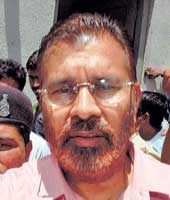 |
 |
| D.G. Vanzara (top) and Sohrabuddin Sheikh |
The henna in his beard is wearing thin, the wrinkles in his face crease like lines of painful memory. Yet the voice does not crack. It is deadpan — a monotone. His narrative is a chronology of events; he does not find it difficult to remember dates, places, names, faces.
When Pathan Shahid Khan Ahmed Khan speaks, everyone listens. That is how it is now, in Salma Ben’s house in Ahmedabad’s Juhapura, the locality to which many Muslims have migrated since the riots of 2002. His audience this afternoon includes a retired additional collector of the Gujarat government, V.J. Moria, Salma Ben, who makes a living out of being a landlady, her brother Saleem A. Wohra, who is charged with violence during the riots in Vejalpur, Afroze, a social activist, and Gazala Paul, an alumnus of Brandeis University, Boston, who runs Samerth Foundation, a non-governmental organisation.
Each of them is Muslim and victimised and, yes, angry. None of them lives with Pathan’s memories. Pathan, too, does not dwell in memories he cannot live without. The 60-plus-man is the link between the terrible pogrom of 2002 and the Sohrabuddin fake encounter case.
His address is the giveaway. Till March 1 2002, Pathan lived in Bungalow no. 18, Gulberg Society, Meghaninagar, Chamanpura, Ahmedabad-16. Five years after that fearful Friday, the housing colony looks derelict. Amid the concrete structures that were once intact apartments and bungalows, the shrubbery is thick enough to shelter snakes; the charred walls and the exposed brickwork complete an ode to the grotesque.
Former Congress MP Ehsan Jaffri’s fingers went numb telephoning the police that morning before he was dragged out of his Gulberg Society home by the mob, kicked, stabbed and burnt. Official records say 38 — the unofficial toll is 68 — men, women and children were wasted. Among the dead and the missing and the unrecognisable were eight of Pathan’s family — his wife, a son, daughter-in-law and grandchildren. His younger son Imtiaz survived. Pathan does not dwell in his memories because he is obsessed with his campaign for justice.
That obsession drove him to Jharania near Ujjain in Madhya Pradesh last December. One morning in December last year, his son-in-law Yaseen Khan Ishaq Khan told Pathan he had a relative who studied law with a brother of Rubabuddin and Sohrabuddin. Sohrabuddin was killed on November 26, 2005, by D.G. Vanzara’s anti-terrorist squad. Vanzara and two of his colleagues have now been indicted for the crime.
For nearly eight months from January 2006, Rubabuddin Sheikh had written repeatedly to the Gujarat, Rajasthan and Madhya Pradesh governments and their police forces, seeking to know the whereabouts of Kauser Bi, Sohrabuddin’s wife. In October, he wrote to the registrar of the Supreme Court. But by December Rubabuddin had nearly lost all hope.
Till he met Pathan.
“I told my son-in-law that we must go to Jharania and we set off on December 6,” he recalls. They went to Indore and then to Ujjain. The long shot paid off when they met Nawabuddin, Sohrabuddin’s third brother, and were directed to Jharania village where Rubabuddin’s house turned out to be the largest one in the village.
“When we reached Jharania,” says Pathan, “We could make out that the Sheikhs are well-to-do people.” Ironically, members of the family of Sohrabuddin Sheikh, killed by the Gujarat police, were also long time supporters of the BJP. The pater familias, Anwaruddin, was in the Jan Sangh for years. His wife and Sohrabuddin’s mother Zaibunnissa is the village sarpanch.
“They are very influential,” says Pathan. “They have so much land that they have parcelled out plots to the villagers. In return the villagers protect them and are beholden to them.” Sohrabuddin had a criminal record but little to indicate that he was a terrorist. On one occasion the Gujarat police charged him with hiding an AK-56 rifle in a well in his village.
When Pathan convinced Rubabuddin that he had come to help, Sohrab’s brother gained in confidence. Rubabuddin even told Pathan that he had been sounded out by Vanzara for a bribe to hush up the case and withdraw his habeas corpus writ in the Supreme Court. An indignant Rubabuddin offered to pay Vanzara twice the sum he was offered if justice was delivered.
“And then Rubabuddin was threatened — he was told that if he ever came to Gujarat, he would also meet Vanzara in an encounter,” says Pathan. Rubab was in Ahmedabad a few days ago pursuing his case.
Pathan immediately called up social activist and co-ordinator of the cases of Gujarat riot victims in Ahmedabad, Raees Khan. Rubabuddin was also put in touch with the Citizens for Justice and Peace and activist Teesta Setalvad. Rubabuddin was re-energised to seek justice.
“If we had not gone to Jharania,” says Pathan quietly, “Rubab would have given up”.
After Vanzara, Pandian and Dineshkumar M.N. were arrested, Jharania’s people celebrated with sweets and fireworks.











